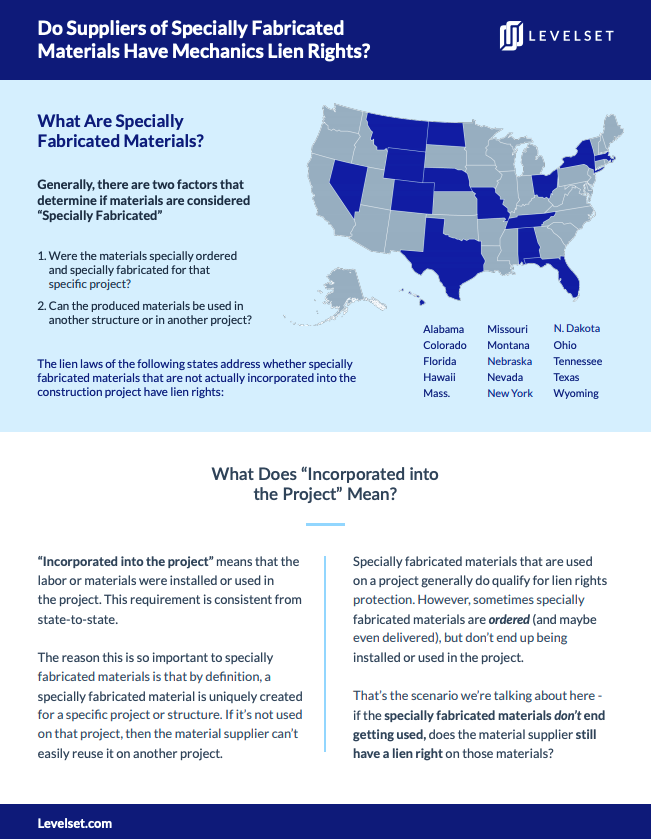

If there’s one rule that remains consistent from state to state, it’s that labor or materials must be incorporated into the project for mechanics lien rights to arise. That is, unless you supply specially fabricated materials. When these materials are incorporated into a project, there is little doubt that lien rights are present.
But what happens if there’s a hiccup on the project and the materials never make their way into the improvement?
In some states, mechanics liens may be filed by specially fabricated materials providers even if the materials are never incorporated into the project. As always, different states treat these situations differently, and there’s plenty of grey areas.
Table of Contents
Tell me if you’ve heard this one before – the definition will change from state to state. But generally, specially fabricated materials refer to materials that are not readily suited for use on a different project and not easily adaptable for use elsewhere.
It may be useful to think about building materials on a spectrum. On one end, you have materials that are universal- if there’s a surplus of these materials, they can be easily repurposed on virtually any other project. On the opposite end of this spectrum, you have materials that were literally tailored for a unique project. And of course, there is the grey area in the middle.
To sort out material that is not clearly on either end of the spectrum, courts often apply a simple test to determine whether material is considered specially fabricated. This, too, is not black and white, as the court will weigh these two factors:
There are a number of states that have specific rules for specially fabricated materials. Typically how it works is that a state will allow these providers to file a lien when they have produced the materials but the materials are not incorporated into the project because the GC or property owner has canceled or interfered with the order.

Download the guide
This state-by-state guide covers lien rights for suppliers of specially fabricated materials in all 50 states.
Sometimes, extra notice will be required of these claimants. Let’s look at the states with specific rules.
Again, this pertains to materials not actually incorporated into the project. If the materials make their way into the improvement, lien rights will typically be available.
This state survey starts out on a weird foot, but hear us out. Alabama’s mechanics lien statute does not mention specially fabricated materials. However, any material provider may have a lien on materials that will be furnished if they provide notice to the owner or their agent in writing.
If the owner/agent then provides notice that they will not be responsible for the price of such materials, though, no lien rights for undelivered materials will be available.
Colorado’s lien statute is already pretty broad in allowing lien rights, but the state does specially fabricated material providers one better. That may be surprising by the face of the statute, though. CO statute provides that lien rights be granted to those parties who furnish labor, materials, or services “to be used in the construction of the building.” Bad look, right? Luckily, a little case law goes a long way to loosening up this requirement.
In Ragsdale Bros Roofing, Inc. v. United Bank of Denver, a Colorado appellate court held that a party could file a mechanics lien for materials specially fabricated for a project even if they weren’t actually installed or consumed in the construction. The only condition is that the materials themselves must actually be delivered to the owner. Read more about this case and how it applies to specially fabricated materials in Colorado.
Much like Colorado, Florida’s mechanics lien rules don’t specifically carve out an exception for specially fabricated materials that aren’t incorporated into a project. Also, like in Colorado, the courts have gone ahead and lent a helping hand. However, in Florida, these materials don’t even have to make it to the job site when the non-incorporation was the fault (either direct or by direction) of the property owner. We’ll let the Florida Supreme Court (via Lehigh Structural Steel Co. v. Joseph Langner, Inc.) speak for itself:
“We are cognizant of the rule that the Mechanics’ Lien Law should be construed so as to afford to mechanics and laborers the greatest protection compatible with justice and equity…
“And we have previously noted and approved the rule, followed in many jurisdictions, that the real property to be improved is subject to a lien for materials specially fabricated for such improvement under a contract directly with the owner of the realty when such materials are not used or delivered by the act or direction of the owner.
“There are strong equitable reasons for holding the owner’s property subject to a materialman’s lien in such cases.“
*Florida Specially Fabricated Materials suppliers take note: If you are specially fabricating materials for delivery or installation you must send your preliminary notice earlier than other potential claimants. As explained in our Florida Preliminary Notice FAQs, the preliminary notice must be sent at the earlier date of 45 days from first furnishing or “45 days from when work begins on making specialty materials.”
Similar to the two states above, Hawaii’s lien law does not hit this issue nail-on-the-head. However, specially fabricated materials are specifically mentioned in the statute, so the distinction has been drawn.
In any event, any leeway for specially fabricated materials is ultimately unclear in the statute and there isn’t any case law to provide guidance. Here’s that statute we mentioned…
“‘Furnishing of materials’ includes supplying of: materials incorporated in the improvement or substantially consumed in construction operations or specially fabricated for incorporation in the improvement; building materials used during construction but not remaining in the improvement, diminished by the salvage value of the materials…“
Massachusetts does specifically mention specially fabricated materials, but this appearance is found in its Little Miller Act, not the lien statute. So specially fabricated material providers on Massachusetts public projects should take note.
Anyway, the statute calls for protection for:
“…any material specially fabricated at the order of the contractor or subcontractor for use as a component part of said public building or other public work so as to be unsuitable for use elsewhere, even though such material has not been delivered and incorporated into the public building or public work…“
However, protection will only be afforded if proper notice is given within 20 days of receiving the final approval in writing for the use of the material. However, once the specially fabricated material is incorporated, no such notice is required. At that point, the materialman is treated as an ordinary material supplier without the notice requirement.
*Take note that claims by specially fabricated material providers are limited to “the extent of its purchase price less its fair salvage value and only to the extent that such specially fabricated material is in conformity with the contract, plans, and specifications or any changes therein duly made;”
Until 2011, there wasn’t really any direction from the Missouri lien law statute or from the courts. However, a bankruptcy decision (In Re Trilogy Development Company) spoke to the issue.
The bankruptcy court found that the labor and materials were “furnished” although they were never delivered to or incorporated in the project. Specifically, the court looked to the remedial nature of mechanics liens and a broad definition of the term “furnish” (think: “to provide” or “to make available for use or delivery”).
The court ultimately decided that the specially fabricated materials were lienable since they were custom to the project and have no other use:
“The Court is mindful of the remedial nature of mechanic’s lien law in Missouri, and that the law’s purpose is ‘to give security to mechanics and materialmen for labor and materials furnished in improving the owner’s property.’
“The dictionary defines “furnish” as to “supply, provide, or equip with whatever is necessary or useful….” The Sixth and Ninth Circuit cases discussed above determined that where material is manufactured and specially designed for a building that the material is “furnished” as soon as prepared and ready for delivery.
“Although both cases are from other states’ courts, the mechanic’s lien statutes in both cases are similar to that of Missouri. The Court also notes that the Uniform Construction Lien Act provides that “furnish” includes specially fabricated materials not physically incorporated into the project.“
The Montana lien statute has a section specific to specially fabricated materials which makes things easy. It states:
“(1) A lien for furnishing materials arises only if:
(a) (i) the materials are supplied with the intent that they be used in the course of construction of or incorporated into the improvement in connection with which the lien arises; and
(ii) the intent described in subsection (1)(a)(i) may be shown by a contract of sale, by a delivery order, by delivery to the site by the lien claimant or at the lien claimant’s direction, or by other evidence; and
(b) the materials are:
(ii) specifically fabricated for incorporation into the improvement and not readily resalable in the ordinary course of the fabricator’s business, even though the materials are not actually incorporated into the improvement.”
While the Montana rule is actually spelled out by statute, it’s not all that different from other states.
The Nebraska lien law is strikingly similar to the Montana statute. Seriously, it’s almost word-for-word.
Nevada’s lien statute does not specifically point out protection for those providing specially fabricated materials, but the definition for “material” in Nevada includes:
“appliances, equipment, machinery and substances affixed, used or to be used, consumed or incorporated in the improvement of property or the construction, alteration or repair of any improvement, property or work of improvement.“
The statute also uses the phrase “furnished or to be furnished” a number of times, which indicates that materials not actually furnished, but contracted for, may be lienable.
Specially fabricated materials appear to fall under New York lien law, and the New York lien statute is more explicit than some there states. Here’s the precise language from § 3:
…” materials actually manufactured for but not delivered to the real property, shall also be deemed to be materials furnished.”
North Dakota’s lien law builds in protections for specially fabricated materials, but it does so a little differently than many states. When defining the word “Materials” in the statute, North Dakota provides:
“‘Materials’ means materials or fixtures which are incorporated in the improvement and those which become normal wastage in construction operations, custom or specially fabricated materials for incorporation in the improvement…“
Following the wording above, it seems like a fair inference that physical incorporation might not be required to file a lien for specially fabricated materials.
Ohio’s mechanics lien rules make things simple. The Buckeye state allows for liens for materials when:
“Specifically fabricated for incorporation in the improvements and not readily resalable in the ordinary course of the fabricator’s business even if not actually incorporated in the improvement.“
Tennessee’s approach is similar to North Dakota’s. Those who “furnish materials” may file a mechanics lien, and “Furnish materials” means:
In a surprising twist, Texas is very clear about liens for specially fabricated materials.
“The lien secures payment for:
(1) the labor done or material furnished for the construction or repair;
(2) the specially fabricated material, even if the material has not been delivered or incorporated into the construction or repair, less its fair salvage value; or
(3) the preparation of a plan or plat by an architect, engineer, or surveyor in accordance with Section 53.021(c).“

Texas rules for mechanics liens and notices are subject to major changes in 2022.
The information on this page has already been updated to reflect the new rules.
In Wyoming, those who “improve” property have mechanics liens. The statute’s definition for “improve or improvement” is as follows:
(A) Demolition, erection, alteration, or repair of any property for its permanent benefit;(B) Any work performed or material furnished for the permanent change of any real property; and(C) Materials manufactured pursuant to contract.
This one may be more of a stretch (the “Persons Entitled to Liens” section doesn’t seem to be very helpful), but it’s still worth looking into. That’s not to say you should file and see what happens, especially considering Wyoming’s False or frivolous liens provision. Still, consulting a Wyoming construction attorney could shed some light on the subject.

We're the mechanics lien experts. We offer forms made by attorneys and trusted by thousands.

Don’t fret! If you didn’t see your state, that doesn’t necessarily mean you aren’t protected. Just because it isn’t apparent in the case law or statute of a state does not mean lien rights don’t exist for specially fabricated materials providers (when the materials aren’t incorporated) in that state.
Plus, there’s always a chance we overlooked some case law that moves the needle one way or another. Unfortunately, there are some states who will forbid these liens. If that’s the case, you may need to look to creative options for securing payment.

Do suppliers of specially fabricated materials to the construction industry have mechanics lien rights | Learn about the 15 states that address this issue